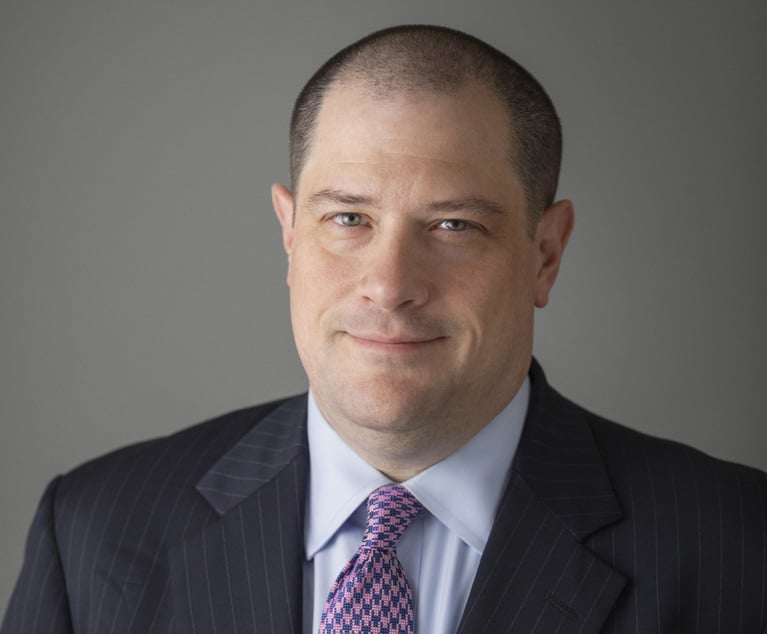Sen. Whitehouse Is Wrong About Public Interest Law
As the Supreme Court wrote in 1963's "NAACP v. Button," "broadly curtailing group activity leading to litigation may easily become a weapon of oppression, however evenhanded its terms appear."
October 04, 2019 at 09:55 AM
5 minute read

Over a half-century ago, the NAACP was under attack for its public interest work. Alabama had sought to neuter the NAACP by forcing the organization to disclose its members and donors publicly. The Supreme Court, in NAACP v. Alabama, recognized that "effective advocacy of both public and private points of view, particularly controversial ones, is undeniably enhanced by group association" and concluded that "compelled disclosure of affiliation with groups engaged in advocacy may constitute as effective a restraint on freedom of association as [other] forms of governmental action."
A few years later, Virginia went after the NAACP because it solicited pro bono clients. If the state had succeeded, it would have been an existential threat to public interest litigation. But the Supreme Court recognized that public interest litigation was often the only means of challenging unlawful government action. In the 1963 decision NAACP v. Button, the court noted that such "litigation is … a means for achieving the lawful objectives of equality of treatment. … Just as it was true for the opponents of the New Deal legislation during the 1930s … no less is it true of the Negro minority today."
Today, the latest challenge to public interest law comes from Sen. Sheldon Whitehouse of Rhode Island. In July, the senator, writing in The National Law Journal, attacked the public interest law movement in general, and my organization Pacific Legal Foundation (PLF) in particular, using the same techniques that the southern states used against the NAACP.
First, the senator accuses organizations such as PLF of improperly soliciting clients. A year ago, from the floor of the Senate, he railed that PLF "came all the way across the country to the shores of Winnapaug Pond, Rhode Island, to hire a client whose case they could take to the Supreme Court with a purpose to make a point." That would have been Anthony Palazzolo, a working-class auto wrecker who couldn't afford to continue litigation after years of arguing that the state had taken his property without just compensation. With free legal representation from PLF, Palazzolo beat Whitehouse, then-Rhode Island attorney general, at the U.S. Supreme Court in 2001.
In his National Law Journal piece, the senator continued that PLF "hand-picked the plaintiff in Knick [v. Scott Township] and shepherded the litigation to the high court." But that's exactly what public interest law firms do: select the best possible clients to make the best possible case to achieve a just result. In Knick, that result was to obtain a ruling that property owners have a right to pursue takings claims in both state and federal courts. Good facts made good law. This is the way we work, just as it is the way that the NAACP works, and was vindicated for doing so in Button.
Whitehouse's second line of attack is to seek public disclosure of public interest donors. His National Law Journal piece was awash in a fevered conspiracy theory comprised of "dark money," "secrecy" and a "vast web of front groups." But the senator should be careful what he wishes for. Putting people's names on a government list based on their giving doesn't affect just one side of the political spectrum. Attacking people and causes he doesn't like will eventually affect those he does.
More to the point, our donors are thousands of Americans who believe that the cause of a limited government that respects the liberties of all Americans is one worthy of their support. Nonprofits such as PLF do not typically disclose donors out of respect for their privacy and safety.
The ability of Americans to donate their time and money to the cause of liberty is what gives life to Benjamin Franklin's conclusion after the Constitution was drafted that we have "a republic, if you can keep it."
We've kept it a republic, in part, because lawyers have been going to court for over two centuries to defend liberty and freedom against unjust laws and policies. Before we even had a Constitution, in 1761, James Otis defended Americans against the hated writs of assistance, which licensed British troops to enter private homes on a mere pretext. On observing that first example of public interest litigation in the colonies, a young John Adams noted that the "child of independence was born that day."
Almost two centuries later, public interest lawyers succeeded in overturning state-sponsored segregation in Brown v. Board of Education. Public interest lawyers have led the fight against the unjust taking of private property for crony-driven redevelopment projects in cases such as Kelo v. New London, Connecticut. And, yes, public interest lawyers have defended the likes of Anthony Palazzolo and Rose Knick against unjust laws that were destroying their property rights. And let's not forget the army of public interest lawyers who are fighting President Donald Trump's environmental and immigration policies. Agree or disagree, vigorous legal arguments from all sides make for a stronger republic.
Whitehouse may not like public interest lawyers who don't agree with him, or who beat him in court, but, as the Supreme Court wrote in the Button case, "broadly curtailing group activity leading to litigation may easily become a weapon of oppression, however evenhanded its terms appear."
James Burling is the vice president for legal affairs at Pacific Legal Foundation. He represented Anthony Palazzolo at the Supreme Court. PLF attorneys represented Rose Knick.
This content has been archived. It is available through our partners, LexisNexis® and Bloomberg Law.
To view this content, please continue to their sites.
Not a Lexis Subscriber?
Subscribe Now
Not a Bloomberg Law Subscriber?
Subscribe Now
NOT FOR REPRINT
© 2024 ALM Global, LLC, All Rights Reserved. Request academic re-use from www.copyright.com. All other uses, submit a request to [email protected]. For more information visit Asset & Logo Licensing.
You Might Like
View All
Protecting Attorney-Client Privilege in the Modern Age of Communications
6 minute read

Lingering Questions at Supreme Court About Climate Change Litigation Need Resolution
6 minute read
Trending Stories
- 1Hagens Berman Accused of Withholding Share of $13M Award in Pharmaceutical Settlement
- 2What to Know About Naming a Law Firm
- 3Texas Shows the Way Forward in Resolving Mass Tort Gridlock
- 4Ninth Circuit Rules on Inherent Authority and FRCP 37(e)
- 5Where CFPB Enforcement Stops Short on Curbing School Lunch Fees, Class Action Complaint Steps Up
Who Got The Work
Michael G. Bongiorno, Andrew Scott Dulberg and Elizabeth E. Driscoll from Wilmer Cutler Pickering Hale and Dorr have stepped in to represent Symbotic Inc., an A.I.-enabled technology platform that focuses on increasing supply chain efficiency, and other defendants in a pending shareholder derivative lawsuit. The case, filed Oct. 2 in Massachusetts District Court by the Brown Law Firm on behalf of Stephen Austen, accuses certain officers and directors of misleading investors in regard to Symbotic's potential for margin growth by failing to disclose that the company was not equipped to timely deploy its systems or manage expenses through project delays. The case, assigned to U.S. District Judge Nathaniel M. Gorton, is 1:24-cv-12522, Austen v. Cohen et al.
Who Got The Work
Edmund Polubinski and Marie Killmond of Davis Polk & Wardwell have entered appearances for data platform software development company MongoDB and other defendants in a pending shareholder derivative lawsuit. The action, filed Oct. 7 in New York Southern District Court by the Brown Law Firm, accuses the company's directors and/or officers of falsely expressing confidence in the company’s restructuring of its sales incentive plan and downplaying the severity of decreases in its upfront commitments. The case is 1:24-cv-07594, Roy v. Ittycheria et al.
Who Got The Work
Amy O. Bruchs and Kurt F. Ellison of Michael Best & Friedrich have entered appearances for Epic Systems Corp. in a pending employment discrimination lawsuit. The suit was filed Sept. 7 in Wisconsin Western District Court by Levine Eisberner LLC and Siri & Glimstad on behalf of a project manager who claims that he was wrongfully terminated after applying for a religious exemption to the defendant's COVID-19 vaccine mandate. The case, assigned to U.S. Magistrate Judge Anita Marie Boor, is 3:24-cv-00630, Secker, Nathan v. Epic Systems Corporation.
Who Got The Work
David X. Sullivan, Thomas J. Finn and Gregory A. Hall from McCarter & English have entered appearances for Sunrun Installation Services in a pending civil rights lawsuit. The complaint was filed Sept. 4 in Connecticut District Court by attorney Robert M. Berke on behalf of former employee George Edward Steins, who was arrested and charged with employing an unregistered home improvement salesperson. The complaint alleges that had Sunrun informed the Connecticut Department of Consumer Protection that the plaintiff's employment had ended in 2017 and that he no longer held Sunrun's home improvement contractor license, he would not have been hit with charges, which were dismissed in May 2024. The case, assigned to U.S. District Judge Jeffrey A. Meyer, is 3:24-cv-01423, Steins v. Sunrun, Inc. et al.
Who Got The Work
Greenberg Traurig shareholder Joshua L. Raskin has entered an appearance for boohoo.com UK Ltd. in a pending patent infringement lawsuit. The suit, filed Sept. 3 in Texas Eastern District Court by Rozier Hardt McDonough on behalf of Alto Dynamics, asserts five patents related to an online shopping platform. The case, assigned to U.S. District Judge Rodney Gilstrap, is 2:24-cv-00719, Alto Dynamics, LLC v. boohoo.com UK Limited.
Featured Firms
Law Offices of Gary Martin Hays & Associates, P.C.
(470) 294-1674
Law Offices of Mark E. Salomone
(857) 444-6468
Smith & Hassler
(713) 739-1250









